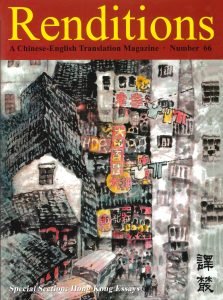Home / Renditions / Publications / Renditions Journal / No. 66
Renditions no. 66 (Autumn 2006)

Special Section: Hong Kong Essays
Hong Kong is perhaps best represented by the essay, a form that has flourished and taken on a uniquely local flavour, especially in the last half-century. This special section includes some of the most notable works from the last half-century by a diverse group of writers. Renditions, itself a Hong Kong institution, provides here a glimpse into the ever-changing society of this vibrant city. A selection of classical poetry rounds out the issue.
127 pages
Table of Contents
| Editor’s Page | 5 | |
| ———— | Shijing: Thirteen Poems
Translated by Michael E. Farman |
7 |
| ———— | Shijing: One Poem
Translated by David Lunde |
23 |
| ———— | Two Anonymous Poems from North-eastern China
Translated by De-nin D. Lee |
24 |
| ———— | Four Tang Poems
Translated by Louise Ho |
28 |
| Wang Wei: Two Poems | ||
| Jia Dao: Heavy Clouds | ||
| Du Fu: Thoughts on Drifting | ||
| Du Mu | Four Poems
Translated by Cornelius Medvei |
32 |
| Ouyang Xiu | Four Poems
Translated by Li C. Tien and John Palen |
35 |
| ———— | Ten Poems on Yangzhou
Translated by Mark Stevenson |
40 |
| Du Mu: Four Poems | ||
| Liu Changqing: Climbing the Pagoda at Spirit Lodge Monastery, Yangzhou | ||
| Zhang Hu: Exploring Huainan | ||
| Xu Ning: Thoughts of Yangzhou | ||
| Wang Jian: Taking in Yangzhou Market One Night | ||
| Wei Zhuang: Returning Through Yangzhou | ||
| Gong Zizhen: Passing Through Yangzhou | ||
| ———— | Four Classical Poems
Translated by Jianqing Zheng and Angela Ball |
52 |
| Han Yu: Listening to Master Ying Playing the Zither | ||
| Meng Haoran: Mooring on the Jiande River | ||
| Zhang Ji: Night Moor by the Maple Bridge | ||
| Li Zhiyi: To the Tune of Fortune-teller | ||
| Hanshan Deqing | Six Zen Poems
Translated by Mary M. Y. Fung and David Lunde |
57 |
| Chang Hsiu-ya | Two Poems
Translated by Herbert Batt and Sheldon P. Zitner |
63 |
| SPECIAL SECTION: HONG KONG ESSAYS | ||
| Cao Juren | Having Adrifted over the Sea of Life: excerpts
Translated by Brian Holton |
66 |
| Si Guo | Unemployed
Translated by David E. Pollard |
72 |
| Xia Guo | The Emotional Appeal of Wonton Noodles
Translated by Heidi Chan |
79 |
| Zhao Tao | My Life with Mirrors
Translated by Simon Patton |
82 |
| Joseph S. M. Lau | Potato-eating Days: excerpts
Translated by Chu Chiyu |
86 |
| Du Du | Going to the Movies
Translated by Eva Hung |
91 |
| Chung Ling Ling | Those Aches and Pains
Translated by Simon Patton |
94 |
| Hui Tik Cheung | Falling
Translated by Florence Li and Janice Wickeri |
97 |
| Yuan Yuan | Good Work Undone
Translated by Heidi Chan |
99 |
| Chan Tak Kam | Blind Fortune-tellers
Translated by Caroline Mason |
103 |
| Wu Yin Ching | High Street
Translated by Janice Wickeri |
106 |
| Dung Kai Cheung | Spring Garden Lane
Translated by Bonnie S. McDougall with Wong Nim Yan |
111 |
| Ye Si (P. K. Leung) | Photographing the New Territories
Translated by Chi-yin Ip |
114 |
| Notes on Authors | 117 | |
| Notes on Contributors | 124 | |
Sample Reading
The material displayed on this page is for researchers’ personal use only. If you wish to reprint it, please contact us.
Thoughts on Drifting
By Du Fu
Translated by Louise Ho
Fine grass and a gentle breeze on the bank,
Tall mast and my solitary boat this night,
Stars descending sweep the great wide plain,
The Moon boils up from the flowing river.
My pen, will it ever bring me fame?
Aged and ill, make I
My office to forego.
Drifting, ever drifting, what I am like:
Between the heavens and the earth one solitary gull.
杜甫:旅夜書懷
細草微風岸
危檣獨夜舟
星垂平野闊
月湧大江流
名豈文章著
官應老病休
飄飄何所似
天地一沙鷗
Going to the Movies
By Du Du
Translated by Eva Hung
AS A CHILD I often went with my elder brother to the cinema for the late afternoon shows. The medium priced seats cost forty cents, and the two of us could go in on just one ticket and share a seat in the cinema. Since I was quite young, I sat on the arm of our seat. That way my brother could sit more comfortably, while my elevated position afforded me a full view of the screen. We saw Burt Lancaster in Apache and The Crimson Pirate, and Ingrid Bergman in Joan of Arc. Though my brother was terribly moved by Bergman’s performance, the film did not leave any strong impression on me. All I remember was that before she died, Joan held two sticks in her hands to form a cross.
I also remember that as the movies played, I would keep asking my brother: ‘Who are the bad guys? Who are the good guys?’ To a child, people had to be either black or white. Dividing everyone into two neat categories-our side and the enemy side-meant that everything would fall into place, and I could then go on watching the movies with peace of mind. But I don’t recall very clearly whether my brother ever answered my questions.
…
